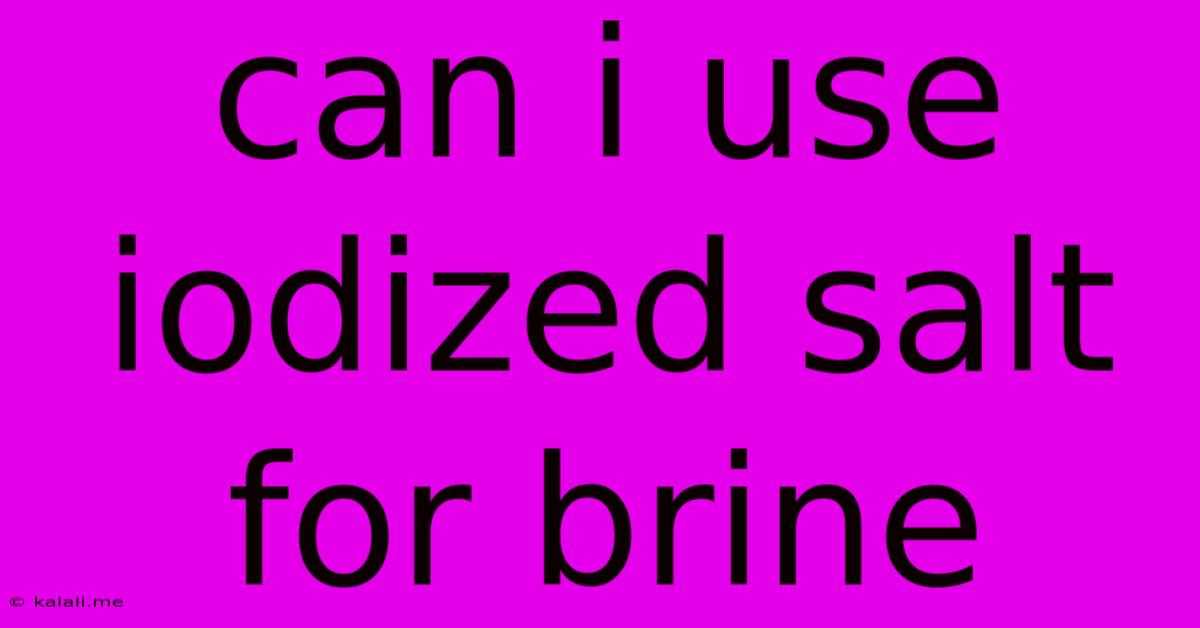Can I Use Iodized Salt For Brine
Kalali
Jun 06, 2025 · 3 min read

Table of Contents
Can I Use Iodized Salt for Brine? A Deep Dive into Salt Selection for Curing
So, you're ready to embark on a culinary adventure, perhaps crafting succulent brined chicken, perfectly pickled vegetables, or maybe even trying your hand at your own delicious corned beef. But a crucial question arises: Can I use iodized salt for brine? The short answer is yes, but let's delve deeper into the nuances of salt selection for optimal brining results. This article will explore the impact of iodized salt on your brine, offering insights and practical advice for achieving the best flavor and texture in your cured creations.
Iodized salt, the kind commonly found in your kitchen pantry, contains added potassium iodide. This addition is crucial for public health, preventing iodine deficiency. However, this added iodine can impact the taste and even the color of your brine, depending on the recipe and the curing time.
Understanding the Impact of Iodine in Brine
While using iodized salt won't ruin your brine, it can subtly affect the final product. Here's a breakdown:
-
Flavor: Some people report a slightly bitter or metallic taste when using iodized salt in brines, especially in those with shorter curing times. This is because the iodine can interact with other ingredients in the brine. However, this is often masked by other strong flavors, like herbs and spices. For delicate recipes, non-iodized salt might be preferred.
-
Color: Iodine can sometimes cause a slightly yellowish discoloration in the brine itself, and potentially a subtle change in the color of the cured product. Again, this is usually negligible and only noticeable in particularly sensitive recipes.
-
Texture: The iodine itself doesn't usually impact the texture of the finished product. The texture depends more on factors like brining time and the type of meat or vegetable being cured.
When to Use Iodized Salt and When to Opt for Non-Iodized
-
Use Iodized Salt When: For most brining applications, particularly those involving strong flavors like spices or acids, the difference in taste and appearance caused by iodized salt will be minimal and often unnoticeable. It's perfectly acceptable to use for everyday brining needs. The convenience of readily available iodized salt often outweighs the minor potential drawbacks.
-
Use Non-Iodized Salt When: For delicate recipes where subtle flavors are paramount, or if you're aiming for perfect color consistency, non-iodized salt (often labeled as kosher salt or sea salt) is the better choice. This is particularly true for recipes with shorter brine times where the iodine's impact is more noticeable. Think of recipes highlighting the natural flavors of the ingredients, such as a simple brined chicken breast or delicate pickled vegetables.
Types of Salt Suitable for Brining
Beyond iodized and non-iodized, several salt types offer unique properties for brining:
-
Kosher Salt: A coarse salt with larger crystals, it dissolves more slowly, offering a more even distribution of salt during brining. It's a popular choice for its clean taste.
-
Sea Salt: A naturally occurring salt with varying mineral content and flavor profiles depending on its origin. It can add a unique, sometimes subtly salty flavor to your brine.
-
Pickling Salt: Finely ground salt, specifically formulated for pickling and brining, ensures quick and even dissolving.
Remember to always follow the recipe's instructions regarding salt quantity, as this is crucial for food safety and achieving the desired level of saltiness.
Conclusion: Making the Right Choice
While using iodized salt for your brine is generally acceptable and won't result in a spoiled product, being mindful of its potential impact on flavor and color is key to achieving the perfect results. Choose iodized salt for convenience in most brining applications, but consider using non-iodized salt for recipes where subtle flavors and perfect color are crucial. Ultimately, the best salt for your brine depends on your recipe and personal preferences. Happy brining!
Latest Posts
Latest Posts
-
How Tall Should Dining Room Table Legs Be
Jun 07, 2025
-
How Often Should A Sump Pump Run
Jun 07, 2025
-
How To Clean Mold Off Cement
Jun 07, 2025
-
Can I Use A Community Email List For Personal Reasons
Jun 07, 2025
-
How To Find Out Why Ffmpeg In Memory Is Large
Jun 07, 2025
Related Post
Thank you for visiting our website which covers about Can I Use Iodized Salt For Brine . We hope the information provided has been useful to you. Feel free to contact us if you have any questions or need further assistance. See you next time and don't miss to bookmark.